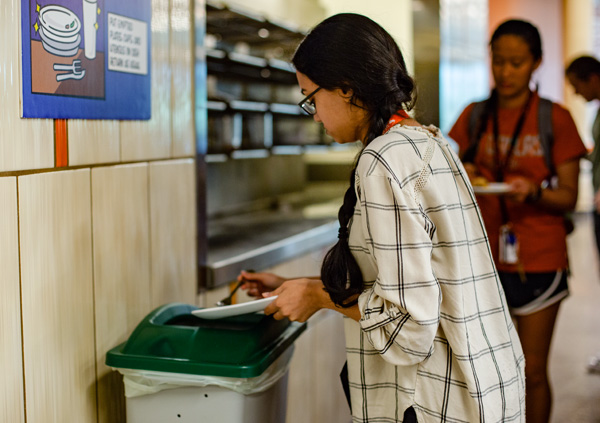UT Dallas Adds Ingredients, Improves Recipe for Cutting Food Waste
By: | Oct. 8, 2018
The University of Texas at Dallas has implemented new composting initiatives to reduce food waste on campus and support the best sustainable practices.

UT Dallas recently added composting bins in the dish return area at Dining Hall West.
The University has already been composting pre-consumer waste from meal preparation in Dining Hall West and the Student Union. Now, students eating in Dining Hall West will be able to scrape everything from their plates, including food waste and napkins, into composting bins before placing their plates, cups and utensils in the dish return area.
“There really should be no food entering the trash anymore,” said Gary Cocke, associate director of sustainability and energy conservation.
The new post-consumer composting will help UT Dallas become a leader in food waste reduction among higher education institutions in Texas, Cocke said. He tracks the University’s progress on sustainability initiatives using the national standard of the Sustainability Tracking & Rating System set by the Association for the Advancement of Sustainability in Higher Education.
“Dining is one of the components we track. Based on knowing what’s going on at other universities, I’m confident in saying we are a leader in addressing food waste among Texas universities and colleges, and we compare favorably against national peers as well,” Cocke said.
“We are a leader in addressing food waste among Texas universities and colleges, and we compare favorably against national peers as well.”
Gary Cocke, associate director of sustainability and energy conservation at UT Dallas
Organix Recycling will compost the food waste. Compost from food waste on campus has been used in landscaping at the Northside housing and retail complex on Synergy Park Boulevard.
Cocke said implementing the post-consumer composting was easy, thanks to changes that had been made by UT Dallas Dining Services, including not using trays and eliminating straws and plastic foam cups.
“It really made the transition as easy as getting bins. We didn’t have anything that would contaminate our compost,” Cocke said.
Carrie Chutes, director of food and retail services, said Dining Hall West is already a 3 Star Certified Green Restaurant, but her goal is to get it to the highest rating.
“We are all educators on campus, and it’s our duty to teach the UT Dallas community the best sustainable practices,” she said.
The Environmental Protection Agency has set up a food waste hierarchy to explain the most sustainable things to do related to food. The best thing, of course, is to not create food waste in the first place.
To that end, students in the UT Dallas Sustainability Club already work through the Food Recovery Network, a student-led organization with 230 chapters at universities across the country, to collect leftovers from campus dining locations and get the food to those struggling to avoid hunger.
During the 2018 spring semester, volunteers recovered more than 1,224 pounds of food on campus and delivered it to Hope’s Door New Beginning Center, a nonprofit organization in Plano that helps women and children who are affected by family violence and need shelter.

Kaumudi Sanampudi, a psychology freshman at UT Dallas, scrapes off leftover food into one of the new bins at the dining hall. Compost from campus food waste has been used in landscaping at the Northside complex.
“We’re diverting a lot of food waste by doing this. For the food that we can’t get to food insecure populations, we’re working up the next rung of the food waste hierarchy to turn it into a soil amendment,” Cocke said.
Another complementary part of food waste reduction is the new Comet Composting Program, a Student Government Green Initiative that will provide small composting “caddies” for students living in on-campus apartments.
Students who participate in training sessions led by Kelsey Lyle, an Ecology Representative, will learn about compostable items and receive a 2.5-gallon composting caddy that can be emptied at two larger composting bins near the apartments.
Joey Campain, the Green Initiative chair for Student Government, said the program was developed at the request of students and in collaboration with University Housing, Dining Services and the Office of Sustainability.
“The EPA estimates that food waste makes up 22 percent of all waste. The Comet Composting Program provides an opportunity for our students to divert this resource away from landfills back into soil and animal feed used by UT Dallas and our surrounding communities,” Campain said.
Media Contact: The Office of Media Relations, UT Dallas, (972) 883-2155, newscenter@utdallas.edu.





